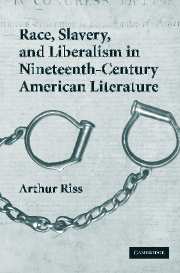Book contents
- Frontmatter
- Contents
- Acknowledgements
- Introduction: the figure a “person” makes: on the aesthetics of liberalism
- 1 Slaves and persons
- 2 Family values and racial essentialism in Uncle Tom's Cabin
- 3 Eva's hair and the sentiments of race
- 4 A is for Anything: US liberalism and the making of The Scarlet Letter
- 5 The art of discrimination: The Marble Faun, “Chiefly About War Matters,” and the aesthetics of anti-black racism
- 6 Freedom, ethics, and the necessity of persons: Frederick Douglass and the scene of resistance
- Notes
- Index
3 - Eva's hair and the sentiments of race
Published online by Cambridge University Press: 22 September 2009
- Frontmatter
- Contents
- Acknowledgements
- Introduction: the figure a “person” makes: on the aesthetics of liberalism
- 1 Slaves and persons
- 2 Family values and racial essentialism in Uncle Tom's Cabin
- 3 Eva's hair and the sentiments of race
- 4 A is for Anything: US liberalism and the making of The Scarlet Letter
- 5 The art of discrimination: The Marble Faun, “Chiefly About War Matters,” and the aesthetics of anti-black racism
- 6 Freedom, ethics, and the necessity of persons: Frederick Douglass and the scene of resistance
- Notes
- Index
Summary
If one reason that Uncle Tom's Cabin has proven particularly troubling is that the novel seems to sanction colonization as the political solution to “the problem” of free Blacks, Dred (1856), Stowe's second anti-slavery novel, has recently been championed for being a substantial revision of Uncle Tom's Cabin's implicit endorsement of colonization. Indeed in Dred, Stowe not only seems to distance herself from the American Colonization Society's infatuation with Liberia by having some of the surviving Black characters migrate to interracial communities in Canada and others move to New York, but also replaces Tom's nonviolence – a nonviolence questioned by many for the way it has “stranded his [Tom's] power in the realm of sentiment” – with the militancy of a prophetic Black revolutionary. Arguing that Stowe's engagement with Black abolitionists – in particular with Frederick Douglass and Martin Delany who both criticized the motives and goals of the American Colonization Society – provoked her to reject African colonization and to acknowledge Black desire for retributive justice, Robert Levine has asserted that “can be regarded as an African American-inspired revision of Uncle Tom's Cabin.”
Levine privileges Dred for the way it includes the African American voices that Uncle Tom's Cabin incompletely represented, convincingly demonstrating that Stowe modifies her political response to slavery and her representation of a Black hero because she listened to Black intellectuals for whom the Liberian solution was thoroughly discredited and for whom Tom's martyrdom seemed to discount the slave's right to violently resist slaveholders.
- Type
- Chapter
- Information
- Publisher: Cambridge University PressPrint publication year: 2006

